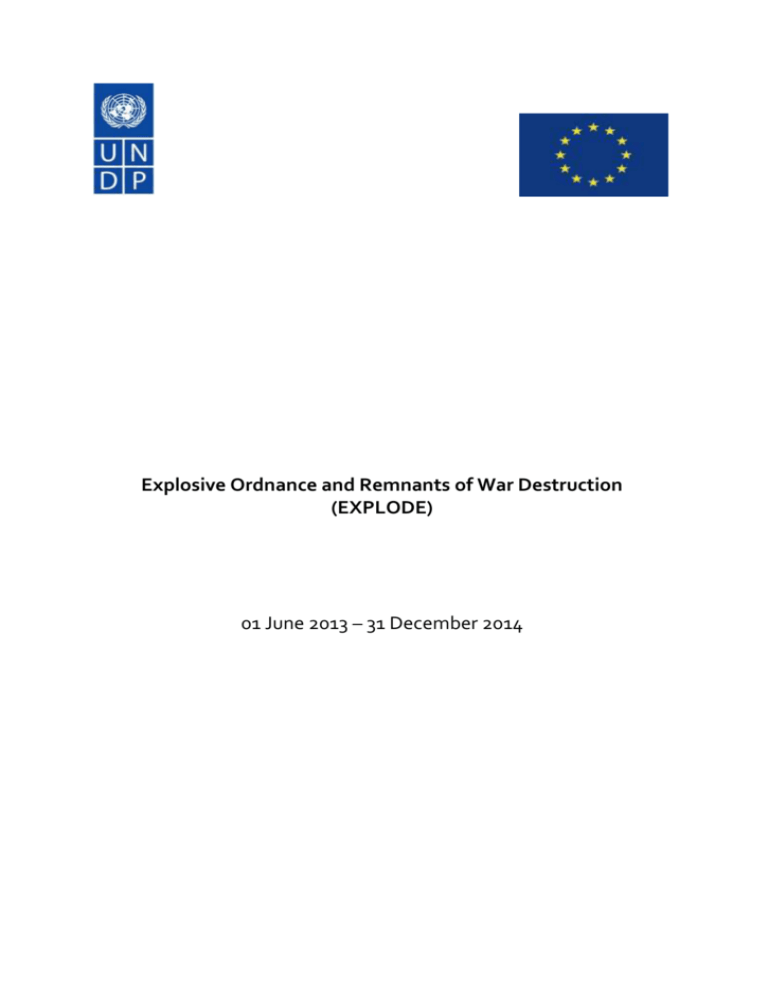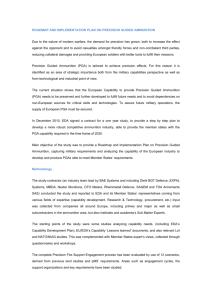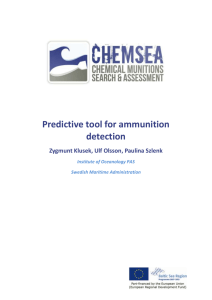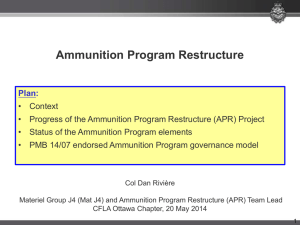EXPLODE Progress Report 2013-2015
advertisement

Explosive Ordnance and Remnants of War Destruction (EXPLODE) 01 June 2013 – 31 December 2014 Explosive Ordanance and Remnants of War Destruction (EXPLODE) Project Title: Explosive Ordnance and Remnants of War Destruction (EXPLODE) Project Details: Contract No: 2013/024-768,2013/319-000 Date of Contract Signature: 01 June 2013 Implementation period: 01 April 2013 – 30 May 2016 Total Cost of Action (Euro) 4,604,914.18 Contracting Authority max financing (Euro/%): 100% Project Reference No.: EXPLODE International UN Organization: UNDP Representative: Yuri Afanasiev Contact Details: yuri.afanasiev@undp.org Contact Person (Programme Officer): Amela Cosovic Medic Project Manager: Jasmin Porobic 2 TABLE OF CONTENTS GLOSSARY OF ACRONYMS .......................................................................................................................... 4 EXECUTIVE SUMMARY ................................................................................................................................. 4 1. COUNTRY PROFILE .......................................................................................................................................... 4 2. PROJECT CONTRIBUTION TO BIH DEVELOPMENT ....................................................................................... 5 3. SUMMARY AND CONTEXT OF THE ACTION................................................................................................... 6 3.1. Project background/Situation Analysis ........................................................................................................ 6 3.2. Strategy and Objectives of the Action ......................................................................................................... 7 3.3. Relevance of the Action ............................................................................................................................... 7 3.4. Management Arrangements ....................................................................................................................... 8 4. OUTPUTS, ACTIVITIES CARRIED OUT DURING REPORTING PERIOD AND RESULTS/ACHIEVEMENTS ..... 9 5. RISKS, ASSUMPTIONS AND DIFFICULTIES ENCOUNTERED, AND MEASURES TAKEN TO OVERCOME PROBLEMS ..................................................................................................................................................... 11 6. COORDINATION AND COLLABORATION .................................................................................................... 11 7. EXIT STRATEGY/SUSTAINABILITY ................................................................................................................ 14 8. CHANGES INTRODUCED IN IMPLEMENTATION .......................................................................................... 14 9. VISIBILITY AND COMMUNICATION .............................................................................................................. 15 Explosive Ordanance and Remnants of War Destruction (EXPLODE) GLOSSARY OF ACRONYMS AFBiH – Armed Forces of Bosnia and Herzegovina ATO – Ammunition Technical Officer BiH – Bosnia and Herzegovina EU – European Union EUFOR – European Union Force EXPLODE – Explosive Ordnance and Remnants of War Destruction FBiH – The Federation of Bosnia and Herzegovina OSCE – Organization for Security Cooperation in Europe RS – Republika Srpska NHQSa – NATO Headquarters Sarajevo MoD – Ministry of Defense MoU – Memorandum of Understanding SACBiH – Small Arms Control and Reduction Programme SALW – Small Arms and Light Weapons SEESAC – South Eastern and Eastern Europe Clearing House for Small Arms UNDP – United Nations Development Programme USA – United States of America EXECUTIVE SUMMARY This report entails activities and results implemented from the official initiation of the project on 01 June 2013 to 31 December 2014. The activities planned under this Action and its Addendum are being implemented successfully and the planned results were achieved. Moreover, the project made a breakthrough in several activities and over delivered in several activities. Significant quantities of high hazardous and chemically unstable ammunition and remnants of war were destroyed assisting the Ministry of Defense implement over 110% of its plan for ammunition destruction in 2014. The pace of disposal has been increased from 40 tonnes per month to 140 tonnes employing different ammunition disposal technologies and capacities. Over 10 million pieces of ammunition has been disposed of in a safe and environmentally benign method including unsafe small arms ammunition, conventional artillery ammunition and large caliber ammunition from the military surpluses. The focus of this intervention was, moreover, on capacity development and infrastructure safety upgrades. The project is repetitively involved in training of senior officers and officials of the Ministry of Defense and the Armed Forces and has trained over 75 individuals on contemporary international standards on ammunition stockpile management. Fifty facilities within four prospective storage sites storing several thousand tonnes of ammunition were upgraded from the safety prospective. Military ammunition disposal facility was improved in terms of occupational safety, risks of unplanned explosion and general safety perspective. 1. COUNTRY PROFILE Bosnia and Herzegovina (BiH) continues to face transitional challenges focusing on the modernization of public institutions in order to advance the European Union (EU) accession process. The implementation of undergoing reforms continues to prove difficult due to BiH’s complex constitutional framework. Day-to-day political events remain demarcated on ethnic lines, both in 4 terms of political organization and the key issues under debate. These fractures are replicated in public policy by geographical variations in service provision and by a distinct lack of social solidarity and burden sharing between national groups, and by extension, between regions of the country. The economy, on the other side, has experienced anemic growth of 0, 5% GDP in 2010 in light of the global economic crisis after negative growth the year before. Foreign and domestic investments fell to their lowest levels in a decade. While the current account deficit improved due to the fall in imports, the budget deficit has widened and the position of both entities is quite precarious in spite of the IMF stand-by arrangement and budget support programmes put in place by the EU and WB. Increase in inequalities of income, educational and health outcomes persist despite aggregate progress in human development terms over the past decade where BH is ranked 68th among the countries with a relatively high HDI. Relative poverty at the state level stands at a concerning 18.2% with the poverty gap at 26.2%, and with pronounced disparities in poverty rates between regions, as highlighted in 2010 UN Regional Disparity Assessment. The percentage of the unemployed registered at the Employment Bureau is 40.6%. However, the unemployment rate calculated according to ILO standards stands at 23.4% (FBiH: 25%; RS: 20.5%). Women are particularly affected by low activity in the labour market and hence the high rate of unemployment among this group. Economic deprivation and unemployment have affected lives of people in the region, which mirrors the variations in public service provision noted above. This spatial inequality has given rise to a wider pattern of social exclusion, which is felt beyond the economic and human development outcomes, in social alienation and political disengagement. In BiH the risk exists that development will be pursued without the needs of socially excluded and vulnerable groups being taken into account. 2. PROJECT CONTRIBUTION TO BIH DEVELOPMENT Explosive Ordnance and Remnants of War Destruction (EXPLODE) works in partnership with the authorities of Bosnia and Herzegovina (BiH) to decrease the threat posed to human security by the large and uncontrolled presence of weapons and ammunition in the country. The project is based on three distinct components, each geared towards securing particular objectives. The components are (i) explosive ordnance and remnants of war destruction, (ii) capacity development, and (iii) infrastructure upgrades. UNDAF Outcome(s)/Indicator(s): Improved government and local community management of mine action, mine risk education and mine victim assistance, and small arms and light weapons at national and local level. Expected Output(s)/Annual Targets: National and local government, community and industrial capacities improved to control and manage the small arms and light weapons and ammunition stocks in BiH. Expected Outcome(s)/Indicator(s): 1. BiH Coordination Board on SALW reinforces, coordinating SALW policies and initiatives in line with the National SALW Strategy; 2. BiH capacities for ammunition destruction and demilitarization developed; 3. Risk posed by unsafe ammunition decreased through elimination of stocks from military possession. Explosive Ordanance and Remnants of War Destruction (EXPLODE) 3. SUMMARY AND CONTEXT OF THE ACTION 3.1. Project background/Situation Analysis The MoD and AFBIH ammunition stocks are currently stored in 16 permanent and 3 temporary locations. According to the future requirements of Armed Forces BiH (AFBIH) that include 21,000 SALW and 7,500 tonnes of ammunition the number of storage sites must be reduced to 7 namely 5 ammunition and 2 weapons storage sites. This requires continuous efforts aimed at destruction of the country’s surplus defense stockpile of 16,000 tonnes. Those munitions present a safety hazard for the local populations and impede their development prospects. BiH is the only country in the region that did not have uncontrolled or accidental incidents although the ammunition stored is over 20 years old in average. Some of the storage sites are close to the borders with Croatia, Serbia and Montenegro and uncontrolled explosion may have a negative impact in the region as well. The safety standards of those facilities are at a very low level enabling such occurrences. The Ministry of Defense has no capacities, capabilities or financial resources to ensure appropriate standards are in place at the storage facilities. Currently, due to the huge quantities of ammunition that still exist and are yet to be disposed of, all 19 storage sites are occupied, consuming approximately 3 million BAM or 1.5 million EUR of the defence budget and requiring engagement of 850 soldiers for guarding and maintenance tasks. Accidental explosions occur and pose risks to civilians (living in proximity) and soldiers (guarding the storage sites). Since 1998, incidents of this nature have been reported in more than a third of UN member states and on every continent except Australia and Antarctica. They have occurred regularly, with an average of three incidents every two months over the ten-year period 1998–2007. Additionally the rate has increased in recent years to more than one incident every two weeks. During the three-month period from August to October 2011, eight new incidents have been recorded, bringing the total number of recorded incidents to 35 for the first 10 months of 2011. These are alarming statistics. There is an urgent need to continue disposal of the explosive remnants of war to prevent devastating consequences to the region, people and property. In Southeast Europe where ethnic tensions still persist and any sparks of violence can quickly become uncontrolled if weapons and ammunition end up in the wrong hands. Moreover, a threat also exists for countries beyond Southeast Europe should weapons and/or ammunition end up in the hands of terrorists. Those weapons and ammunition must be destroyed urgently. Based on extensive field experience, expertise and institutional partnership with the Ministry of Defense and the Ministry of Security, law enforcement agencies and the Small Arms and Light Weapons Coordination Board, UNDP work to demilitarize explosive remnants of war, ammunition and to improve stockpile management. This is a cross-cutting intervention that will have an impact on: Improved Safety of Local Population by the reduction of potential risks to the local communities presented by inappropriate ammunition and explosive storage infrastructure, combined with decaying ammunition; Improved Development Prospects for the Local Population through destruction of highly hazardous and unstable ammunition that is declared for destruction due to its poor condition and improvement of safety of storage facilities; Regional Confidence and Security Building Measures (CSBM) through already demonstrated transparency and full cooperation; 6 The Implementation of National SALW Control Strategy of Bosnia and Herzegovina which is designed to ensure compliance with all appropriate international agreements and mechanisms for Explosive Remnants of War Control and armed violence reduction; Support to Public administration reform within the Ministry of Defense through contributing to the establishment of efficient and effective ammunition stockpile management. 3.2. Strategy and Objectives of the Action The programme impacts will lead to attaining several important socio-economic, development and security results. The most important of these are increasing human security for the communities throughout Bosnia and Herzegovina and releasing government resources used for stockpile management thereby enabling them to be invested in other priority public sectors. The measure is being implemented by the United Nations Development Programme (UNDP) in Bosnia and Herzegovina in cooperation with the Ministry of Defence of BiH and the OSCE Mission to Bosnia and Herzegovina includes the following activities: Destruction of remnants of war to improve security in BiH and support to defence and security reform processes in BiH including democratic governance of security and defence sectors. Safety upgrade of national facilities through commissioning of equipment and job creation at the national industrial facilities; Improving capacities of the Armed Forces personnel to safety handle ammunition and to establish sustainable ammunition stockpile management process. In addition, the Project implements post-flood intervention in support of the Armed Forces capacities for urgent mine action as well as for landslide remediation. These activities will target the Demining Battalion of the Ministry of Defense in implementation of the findings stemming from the Post-flood Recovery Needs Assessment as well as the landslide that endangers ammunition and explosive storage in the ammunition disposal facility, TROM, Doboj. 3.3. Relevance of the Action High level of unsafe ammunition quantities stored in the military storages require immediate attention. As mentioned, the most of those munitions were very old and chemically unstable for further storage due to the high potential of uncontrolled explosions. Those accidental explosions occur and pose risks to civilians (living in proximity) and soldiers (guarding the storage sites): since 1995, 218 incidents have caused 4,700 fatalities and 5,700 injuries world-wide. These are alarming statistics. All countries in the region were impacted by the uncontrolled explosions causing severe damages to populated area creating humanitarian crisis at these micro-locations. In addition, the explosion of this type resulted in dozens of deaths and hundreds of injured civilians. In its endeavor toward the European Union and NATO, Bosnia and Herzegovina must solve its legacies of war. This burden hampers Bosnia and Herzegovina ability to deal with other Euro-Atlantic accession issues, therefore the destruction of ammunition and improvement of capacities and infrastructure represents a critical area of intervention that would assist the country re-allocate its focus and resources to other priority areas once the unsafe ammunition is no longer an issue. Explosive Ordanance and Remnants of War Destruction (EXPLODE) BiH Ministry of Defense lacks capacities to tackle the issue individually. The complex nature of the project requires international assistance and specific knowledge and expertise. The disposal of high hazardous ammunition and complex weapon system entails knowledge of different military technologies and technological disposal processes that go beyond local or regional expertise. With disposal of ammunition, this project goes beyond its impact in the country. It contributes to regional and European security. It has become common to link weaponry from Bosnia and Herzegovina to different European black markets or armed violence incidents. 3.4. Management Arrangements UNDP aligned its sectors with the EU enlargements requirements. Project EXPLODE is part of Human Security and Justice Sector. The project is implemented through the national implementation (NIM). NIM implementation modality is applied when there is an adequate capacity within the government to carry out functions and activities of the project or the programme. The management of the project will be in line with the PRINCE2 management methodology. The component on stockpile management will be implemented in partnership with OSCE based on the existing partnership arrangements between two organizations. UNDP and OSCE will be represented jointly and will have a common position on the subject matters related to the Component 3. The decisions between two organizations will be result oriented and will be made consensually. The decision making process will be based on the principles of mutual respect, technical expertise and the highest level of professionalism. Project Organizational Structure Monitoring the Action European Union Delegation Project Board User Executive Suppliers - BiH Armed Forces - BiH MoD - BiH MoD - UNDP - OSCE - SALW CB - JCDS Project Assurance UNDP Programme OSCE Mission OSCE Security Cooperation Advisor/Regional Coordinator 8 UNDP Project Manager Project Support Project Associate Procurement Associate Ammunition Destruction Capacity Development Stockpile Management Specialist Ammunition Technical Officer Engineer/Infrastructure Advisor Ammunition Technical Officer Capacity Development Coordinator Stockpile Management 4. OUTPUTS, ACTIVITIES CARRIED RESULTS/ACHIEVEMENTS OUT DURING REPORTING PERIOD AND Ammunition Destruction Project EXPLODE has brought extensive progress to the rate of destruction of excess ammunition. In its initial phase, the intervention was focused on the military ammunition destruction site of TROM, Doboj. Over 10 million pieces of ammunition were destroyed equaling to over 2,000 tonnes. The Project deployed 13 ammunition pyrotechnics and specialists to the location in order to overhaul and operate newly installed ammunition disposal machinery. A UNDP-led team now has been working in parallel with the BiH Armed Forces to enable the use of both ‘old’ and newly developed technology. This merge of expertise and technology has led to an increase in progress from 40 tonnes to 140 tonnes of ammunition disposed of a month. Project EXPLODE is engaged in operating pull apart machine that disassemble ammunition from 23mm to 105mm. Also, the project's personnel operates the explosive waste incinerator as well as explosive melting facility. One of the main focuses of Project EXPLODE is large caliber ammunition. To that end, the Project engaged in disposal of two-piece ammunition including 130mm to 155mm munitions. These technologies ensure that ammunition is demilitarized in its entirety that enables issuance of freefrom-explosive and demilitarization certification. These certifications represent a novelty that was introduced by the Project. In total, the project operates with five demilitarization lines and is fully incorporated into the tactical level demil operations in the military ammunition disposal workshop - TROM, Doboj. The project has also developed a methodology for the disposal of white phosphorus and agreed upon a strategic partnership with other international partners for the disposal of high hazardous munitions and complex weapon systems, including the air bombs and rocket systems. While 58 bombs were disposed of in partnership with the US government operator additional close to 400 unsafe air bombs were allocated for disposal and are pending the destruction due to the weather conditions. The white phosphorous ammunition has been approved by the Minister of Defense for disposal engaging urgent disposal decision-making process due to the poor condition of munitions. Explosive Ordanance and Remnants of War Destruction (EXPLODE) Project EXPLODE identified the most suitable regional partner and plans to commence disposal of these munitions in April depending on the pace of implementation of the decision of the Ministry of Defense. Apart from those, Project aims at inspecting and disposal of Luna rockets. Those rockets represent a complex weapon system that requires specific expertise. The rockets are designed to carry nuclear warhead or explosive-filled warhead. Those are Soviet made rocket systems with relatively unknown demilitarization plan. UNDP, however, developed a disposal methodology that will ensure safe disposal of these munitions once the Ministry of Defense adopts necessary decision. In a post-flood recovery endeavor, Project EXPLODE partnered with the Demining Battalion in order to capacitate them to engage in efficient mine action in line with the findings of Mine Action Recovery Needs Assessment. It is anticipated that the Project will conduct necessary trainings and commission adequate equipment that will enable the Demining Battalion to implement its mine action activities on a safe and expeditious manner. Stockpile Management Capacity Development Project EXPLODE, in partnership with the DHA Global, organized a training for senior officers and officials of the Ministry of Defense and the Armed Forces of Bosnia and Herzegovina on contemporary trends in weapons and ammunition stockpile management. The training was held from 24 November to 13 December 2013. It targeted 12 primary beneficiaries and over 35 secondary beneficiaries. Through a careful and systematic selection of candidates, the Minister of Defense nominated 12 senior officers and officials to attend the training. Those 12 individuals represent the core decision makers. They have translated the newly acquired knowledge into the weapons and ammunition stockpile management context of Bosnia and Herzegovina. The content of the training was directly incorporated into the regulatory framework on overall weapons and ammunition stockpile management. To that end, five ammunition stockpile management guidelines and SOPs were amended to incorporate these newly acquired knowledge. The training conducted in the UK was attended by 25 students from the Mechanical Engineering Faculty, Defense Technologies Department, Sarajevo through a distance learning modality – video link between the UN House, Sarajevo and the venue of the training in the UK. The students also had a chance to listen to lectures conducted by UNDP and US-contractor Sterling International. The improvement of capacities through infrastructural upgrades in the military facility at TROM, Doboj commenced with the land slide diagnosis, installation of the anti-static flooring and the fire protection analysis. Through 2014 the activities on safety upgrades continued and the first phase of the infrastructure upgrades of the military ammunition disposal facility, TROM, Doboj, was finalized. The safety infrastructure intervention included laying down of the anti-static flooring, erecting reinforced concrete barriers, improvement of the heating and ventilation systems to prevent settling of explosive dust, as well as small infrastructure upgrades for improvement of the electricity network. The second phase safety infrastructure upgrades were defined and will commence in the first quarter of 2015. In response to the floods recovery, the Project initiated the landslide remediation process, liaised with the Demining Battalion and finalized the needs assessment process to design a capacity development intervention within the scope and mandate of the Project. Capacity development component of Project EXPLODE represent an important element strongly linked to sustainability of the intervention. There were numerous working level meetings, workshops, coordination initiatives and trainings for over 40 personnel of the Ministry of Defense of Bosnia and Herzegovina. 10 Through systematic capacity development events, entitled the Master Plan Special Events, the Ministry of Defense personnel is constantly being trained on the topics relevant to the ammunition stockpile management. It is important to underscore that the Project developed an innovative planning methodology for ammunition destruction and transport that resulted in an increase of the ammunition disposal plans from 800 tonnes in 2014 to 2,300 tonnes for 2015. The methodology is based on the thorough assessment of the technological capacities and operational management of the processes directed to the ammunition disposal. Project EXPLODE hosted two Strategic Committee events and directly contributed to the decision making process with initiatives provided to the Committee. Safety Improvement of the Ammunition Storage Conditions The initial implementation period has been focusing on defining priorities for ammunition depot safety upgrades. The priorities have been defined and approved. The works commenced in May 2014 and the first phase has been finalized. The list of priorities has been agreed upon with the Ministry of Defense and international partners. Those thorough reconstruction of key priority facilities to improve safety conditions for ammunition storage in the selected sites. There are four prospective weapons and ammunition storage locations in which Project EXPLODE operates. The locations are Kula, Mrkonjic grad; Teufik Buza, Visoko; Krupa, Hadzici and Rabic, Derventa. These locations were agreed upon with the international community as well as the Ministry of Defense of Bosnia and Herzegovina as location requiring safety upgrades. The activities are implemented in close cooperation with the OSCE Mission to Bosnia and Herzegovina to ensure complementarity of interventions and to enhance the impact of the project. The safety interventions were implemented at 50 facilities in the four mentioned locations. The main aim of the upgrades is to eradicate humidity from the storage facilities and to create a steady temperature environment. The humidity and temperature fluctuation are, together with age, the two worst enemies of the ammunition stability. The infrastructure interventions aimed at addressing these issues included reconstruction of the roofs, ceilings, ventilation systems, drainage systems as well as entrance ramps. In parallel to this process, the Project installed data loggers that constantly follow the temperature and humidity. These loggers enable us to empirically justify the intervention and to analyze these fluctuations within the specific storage facility. Preliminary findings of the analysis indicate that humidity goes over 95% while temperature fluctuates dramatically. These are negative variables that must be targeted with appropriate infrastructure upgrades. 5. RISKS, ASSUMPTIONS AND DIFFICULTIES ENCOUNTERED, AND MEASURES TAKEN TO OVERCOME PROBLEMS The project implementation was marked with number of risks and difficulties that had to be mitigated and overcame. Those were linked to complex political environment, environmental concerns and consideration, difficulties in determination of exact quantities of ammunition stockpiles, complex administrative procedures before the Ministry of Defense and requirement of specific expertise. Explosive Ordanance and Remnants of War Destruction (EXPLODE) There were many activities and actions implemented to ensure successful implementation of the project plans and activities. The most notable risks and difficulties and responses to those are listed below: Type of risk Political Political Environmental Technical Operational Operational 6. Description of risk Action to overcome Lack of political will to expedite the Extensive consultation with ammunition disposal process government officials were conducted in order to communicate the message on the instability of ammunition and the urgency of their disposal The ownership over proceeds after disposal The appropriate prioritization of ammunition was not decided upon of ammunition focusing on high hazardous ammunition enables successful implementation despite the risk Open detonation may cause negative The strict environmental environmental impact measures were applied including soil sampling and land remediation. The activities are being implemented in partnership with the US government contractor that engages in demolition of ammunition directly. The most complex ammunition types were Comprehensive disposal to be disposed of. Those were never methodology was developed by disposed of before, hence the disposal UNDP’s Ammunition Technical methodology was unknown Officers that ensured safe disposal of ammunition Inaccurate ammunition inventory lists may The ammunition that is to be cause changes in project budget structure disposed of was physically counted and controlled in order to determine exact quantities Complex administrative procedure may Advanced planning exercises cause delays in project implementation were conducted for the forthcoming administrative processes in order to have timely implementation of the project COORDINATION AND COLLABORATION The ammunition disposal process attracts many national and international actors. OSCE, EUFOR, EU and NHQSa were organizations that have shown special interest in the field. To that end, the Ministry of Defense created a Master Plan that ensures a coordinated approach by different international and national partners and organizations. The issues are being discussed at the technical level through three working groups – Krupa 2017, Glamoc + and TROM. Once technical level details are agreed upon the activities are elevated to the Coordination Committee to further delegate activities and 12 coordinate different players in the field. In case decisions are needed that would ensure implementation of the activities, those are addressed at the Strategic Committee. The collaboration with the Ministry of Defense has been successful. The Minister of Defense approves annual work plans developed in cooperation between relevant units of the Ministry of Defense, Armed Forces of BiH and UNDP. This ensures smooth implementation of Project EXPLODE and avoids duplication or overlap of project activities with other partners. In addition, UNDP has been successfully cooperating with the Ammunition Verification Commission of the Armed Forces of BiH, the Commission for Ammunition Surpluses Disposal, entity governments and their Directorates for Defense Industry as well as with the Presidency of Bosnia and Herzegovina. UNDP is seen as a technical knowledge and expertise hub. Above mentioned organizations and committees were addressing UNDP when specific ammunition-related expertise is required. This IfS action is fully compliant with the broader EU and the international response. Project EXPLODE represents an important segment of the wider EU-led mandate in Bosnia and Herzegovina, more specifically the mandate led by the EUFOR Mission in Bosnia and Herzegovina. The Ministry of Defense, with EUFOR/NHQSa support, established a governance mechanism of the overall weapons and ammunition stockpile management. Project EXPLODE participates in the work of the Steering and Coordination Committee as well as the working groups established thereof. As an example, while the Ministry, with EUFOR support, conducts inspection of munitions, UNDP destroys ammunition allocated for destruction. Moreover, the priorities for infrastructure upgrades were defined through the working groups supported by EUFOR/NHQSa. The Project closely coordinate its activities and implement in partnership with UNDP/SEESAC. On 09 December 2013, the Council of the European Union passed the Council Decision 2013/730/CFSP in support of SEESAC disarmament and arms control activities in South East Europe. The decision was made within the framework of the EU Strategy to Combat the Illicit Accumulation and Trafficking of SALW and their Ammunition and includes: Increased security of stockpiles: through the renovation and security improvements to storages of arms and ammunition. Stockpile reduction: through the destruction of surplus arms and ammunition held in storages. Improved marking, tracing and registration of SALW: through the provision of support to the establishment or enhancement of existing weapons registration and record-keeping systems. Enhancing regional cooperation on awareness raising, information sharing and knowledge transfer: through the facilitation of regional cooperation between national institutions tasked with arms control. Collection and Awareness Raising Campaigns: supporting existing or future efforts to collect illicit and unwanted weapons held by the population. In addition, Project EXPLODE expands its cooperation with the US Embassy in BiH, who is also active in the field of stockpile management. The activities are coordinated to ensure there is no overlap. UNDP and the US Embassy are exploring options to jointly implement activities in support of stockpile management which will further enhance the impact of intervention. Explosive Ordanance and Remnants of War Destruction (EXPLODE) 7. EXIT STRATEGY/SUSTAINABILITY UNDP has been focusing its assistance to the Ministry of Defense in relation to the high-hazardous munitions for which the Ministry of Defense has no capacities to deal themselves. During the disposal process supported by UNDP it is ensured that the relevant staff of the Armed Forces are present in order to assume new knowledge on the specific disposal methodologies that UNDP applies. Moreover, UNDP has arranged number of trainings to increase the capacities and capabilities of the Armed Forces of BiH to assume those activities in the future. With the upgraded ammunition disposal facilities, the disposal process has been simplified and the security standards have been significantly increased. This will ensure easier transfer of know-how to the Ministry staff. UNDP, in addition, worked with the Ministry of Defense in prioritization of quantities and types of ammunition that are to be disposed of. Better prioritization of ammunition to be disposed of will ensure that highly complex ammunition systems are disposed of within UNDP mandate and the more simple types are left for the Ministry of Defense to dispose of with the newly installed machinery. Based on the request of the Ministry of Defense, UNDP has extended its support to the improving capacities of the BiH Armed Forces for control and technical inspection of highly complex ammunition systems. Project EXPLODE initiated the Master Plan special events that promotes specific topics related to the overall ammunition stockpile management. This process contributes to increased capacities of the Ministry of Defense to individually implement activities that come under safe handling of munition stockpiles. The infrastructure upgrade improve storage conditions and increases capacities of the Ministry of Defense for proper maintenance of both storage facilities and munitions. These activities directly contribute to prevention of unplanned explosions of munition sites. This approach will ensure sustainability of the project activities. The Armed Forces will be capacitated to conduct control and technical inspection of ammunition, to disposed of ammunition they have equipment and knowledge and to plan disposal activities adequately. Nevertheless, taking into account high quantities of ammunition and different types of complex ammunition systems there will be a need for UNDP’s support for the following three to five years before the Ministry is fully capacitated to assume this activity themselves. 8. CHANGES INTRODUCED IN IMPLEMENTATION During May, 2014 heavy rains fell over Bosnia and Herzegovina, causing massive flooding in northern, eastern and central parts of the country bordering Croatia and Serbia. The floods are the worst in 120 years and have brought enormous destruction in a country that is still recovering from the consequences of the 92-95 war and where significant groups of the population suffer from chronic poverty and unemployment. The natural disaster affected a quarter of the territory of Bosnia and Herzegovina and approximately one million people, which is approximately 27% of the country’s population of 3.8 million. Nearly 50% of governments were hit by the floods, among them 46 suffered severe damage and destruction, where urban, industrial and rural areas were completely flooded with water, cut off and without electricity, water or communications for days. Consequently, houses, infrastructure, schools, hospitals, private facilities, farms and crops were wiped out, causing deterioration of public services, local economy and agriculture activities. In cooperation with national and local governments, the UN, European Union and the World Bank conducted a thorough recovery needs assessment to identify medium and long-term recovery 14 priorities in a variety of sectors. The results and findings of this assessment will inform the design of relevant interventions to address the consequences of the floods in an integrated and sustainable manner. UN has identified the critical recovery demands and their financial projections for the next few months, as follows: Rehabilitation and reconstruction of public buildings and services, including app. 90 health and education centres, delivery of temporary power, water, sanitation services, public administrative buildings and institutions; Shelter and Housing, including cleaning, rehabilitation and repair of a total of 25,000 priority dwellings (out of est. 75,000 damaged); Debris Management and demining, incl. mine clearance/marking and solid waste/debris removal; Community Infrastructure: small roads & bridges, including repair and replacement; Water, Sanitation and Sewage, including restoring technical and potable water supply and sewage systems where possible; Livelihoods and Agriculture, including urban quick income projects, assistance to restore farming supply networks and small-scale production, planting and soil decontamination; This natural disaster was also directly linked with Project EXPLODE in three district areas: a) disposal of ammunition from flooded storage site, b) improving capabilities of the Armed Forces of BiH to engage in emergency mine action and c) remediation of landslide threatening military ammunition disposal facility, TROM, Doboj. In that respect, Project EXPLODE was amended to include two latter activities therefore project expanded its portfolio to support the Demining Battalion of the Armed Forces and in remediation of the landslide in the named military facility. The project duration was expanded to May 2016 and the value of the project was increased for 750,000 EUR. Apart from that, the project is achieving better results than anticipated in the ammunition disposal component. Therefore, a changes in the budget structure under the same heading were introduced to align the budget structure to the improved results. 9. VISIBILITY AND COMMUNICATION The project activities are being promoted on the social media as well as different media through the country and the region. An online platform was created that enables weekly updates of project activities. The platform can be accessed through this link: http://undp.akvoapp.org/project/931/ . Project EXPLODE, also, is recognized as one of the flagship project in the security sector and is promoted at the UNDP website: http://www.ba.undp.org/content/bosnia_and_herzegovina/en/home/operations/projects/crisis_pre vention_and_recovery/project_sample.html . Project milestones are being distributed further through twitter account of project manager www.twitter.com/PorobicJasmin as well as through several printed materials such as infographics and leaflets. All military facilities in which project implements its activities have a project’s plaque attributing the efforts of project donor, partner and implementers. Explosive Ordanance and Remnants of War Destruction (EXPLODE) ` 16








